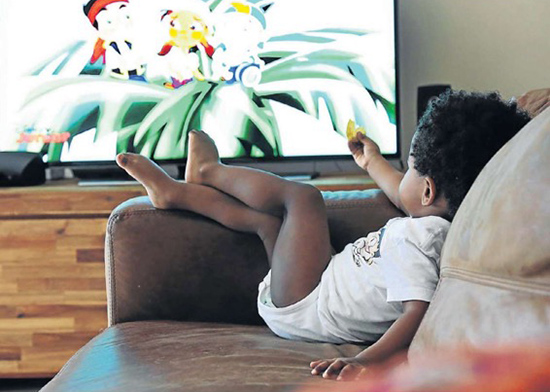The article below appeared in the Sunday Times, 6 November 2016
By Nivashni Nair and Suthentira Govender
Cellphones, tablets and TVs are replacing hugs and snuggles as infants spend more time in front of screens.
Concerned about the high levels of screen time to which babies and toddlers are being exposed, the American Academy of Pediatrics has recommended that children younger than two should not watch TV, videos or DVDs at all.
According to a recent report by the National Center for Health Research, American children under two spend more than two hours every day watching TV or using other screen media.
The centre warned in a recent research paper that videos for babies and toddlers — such as the Baby Einstein series — may slow down learning.
South African infants, according to parenting experts and psychologists, are mirroring their American counterparts.
Screen time appeared to replace interactive playtime which included “hugs and cuddles and direct talk with baby”, said Johannesburg counselling psychologist Dr Ingrid Artus.
“Most working moms and dads are extremely limited regarding available family time in general, so passive screen time for many serves as a type of babysitter.”
Artus said the first two years were a critical learning period in which children should be exposed to various interactive activities to develop gross and fine motor skills and language, emotional and social skills.
“Research studies have shown that passive screen time can compromise early childhood development.
“Parents talk less with their children when they are occupied with screen time. Talking directly with babies and toddlers is important for social, emotional and language development. Excessive screen time can be linked to sleep disturbance and attention problems.
Media Monitoring Africa’s William Bird said no statistics for baby screen time was available in South Africa, but given the increasing prevalence of smartphones and tablets, it would not be surprising that these devices were being used to not only distract infants but also as substitutes for general care.
Wessel van den Berg, who heads Sonke Gender Justice’s child rights and positive parenting desk, believes screen time causes a disconnect between parents and children.
“The issue is a tricky one, since most children in South Africa live with only one parent, usually mothers. It is easy to say that parents should cut down on screen time, but for a single mother with two or more toddlers, it’s unfortunately often the only option.”
Parents are divided on the screen time debate.
Genevieve Lanka-Govender’s 18-month-old daughter, Zoehannah, is fascinated with all things digital. “She can unlock phones, take it off flight mode, send SMS and WhatsApp messages and she loves making calls. She once called my colleague at 11pm and had a full conversation with him. Thankfully he was happy to do so.”
While she has exposed her child to diverse activities like museum visits, concerts and educational toys, Lanka-Govender said it’s difficult to cocoon a child in a world that was constantly evolving digitally.
Nompumelelo Kunene limits screen time for her 17-month-old son, Lubanzi. “He watches a bit of TV in the morning and the news with me in the evening. But I encourage lots of playtime as well,” Kunene said.
Kim Mari does not allow her eight-month-old daughter, Lyra, to watch TV, play on tablets or use cellphones. I see how addicted they can get and there is enough time when she is older to have some screen time.
“It’s hard with her brothers having iPads, but I will try not to let her use it for a while,” said Mari.


